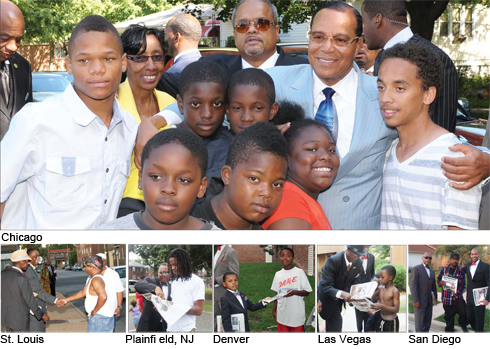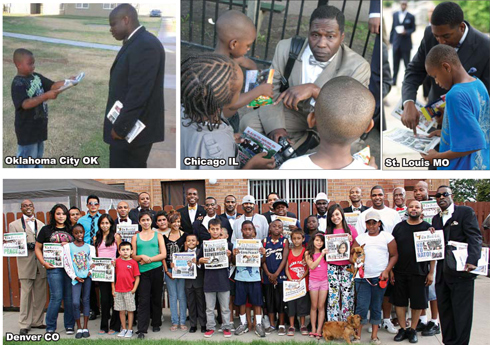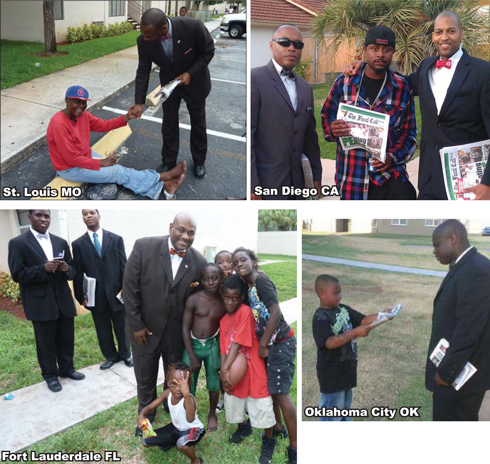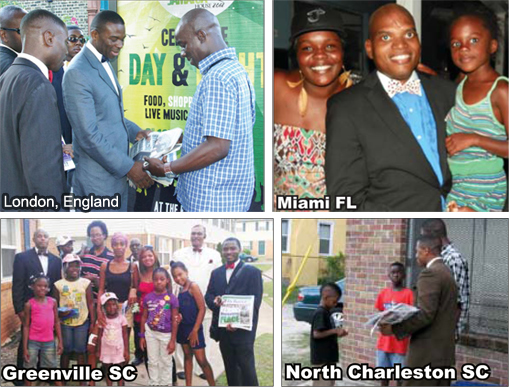Love Ye One Another.. Farrakhan, Nation of Islam push message of peace, love and unity
By Richard B. Muhammad -Editor- | Last updated: Aug 23, 2012 - 7:59:46 AMWhat's your opinion on this article?
‘There is hope’
(FinalCall.com) - Savage. Tatted. Angry. Saggin’. Just a few words used to describe young Black men in the ghettos of America and in cities and towns from Portsmouth, Va. to Port-of-Spain, Trinidad. Despite the ugly image of Black youth, the Honorable Minister Louis Farrakhan and the Nation of Islam see a much different picture. They see a fearless cadre of young men in need of guidance, knowledge and one essential element: Love.

Since Muslims under the leadership of the near 80-year-old Minister have aggressively pushed street campaigns and door-to-door efforts to promote peace and defuse tension, the response from so-called heartless youth and “deadly” gangbangers, whether in Boston, Mass., or Brixton in London, has been inspiring. The youth have gravitated to a man whose method comes straight out of the example of Jesus. His is a work of redemption based on a deep love for Black people.
At stops from “Terror Town” on the East Side of Chicago to “The Wild 100s” on the Far South Side, Min. Farrakhan accompanied by the Fruit of Islam, the men of the Nation of Islam, walked the streets, shook hands, softened hearts and went into homes. “Our people need to know others are concerned about what is happening to them. Our young people are killing one another and they don’t know how it all started,” he said.
“And even though we don’t have resources the one resource that we do have is the key to opening not only the door but the hearts. We have a valuable product … . Elijah Muhammad, our teacher, produced young men and young women, highly civilized, courteous, respectful of authority, very highly disciplined,” he said. “We want to be of service that is the point, we believe we have something to offer and I must respectfully say, if we fail … the alternative is hardly, it’s unthinkable, because government is vexed with our young people and they (government agencies) are armed and dangerous.”
That alternative, as the Minister has warned since his Stop the Killing Tours of the 1990s, is laid out in scripture under the sign of pharaoh. In the Bible the wicked ruler plots against the children of Israel, telling his advisors, “let us deal wisely with them, lest they join on to an enemy, remember our evil against them and come against us.” Pharaoh moves to kill boy babies to protect his rule. If the Bible is prophecy and not history, and it is, one would be hard pressed to argue the modern version of that Bible story does not fit Black people in America and Black males.
Political leaders have decried the growth of “militant” Islam in prisons and among Black males. America wrongly sees Islam as the enemy and fears a change in religion and allegiances. If that doesn’t sound like 21st century pharaoh paranoia, I don’t know what does. Couple that fear with Black children whose schools are virtual prisons, teenagers marked with felony charges for drug dealing, racial profiling, joblessness, AIDS, despair and desperation and you can see how easily Black males are marked as society’s worst problem. Our young men in their current state—reduced to almost nothing by the oppressor—are not seen as valuable to White America nor by many of us.
They are seen as a clear and present danger and the response is tougher penalties, more militarized police departments and virtually no attempt at prevention or rehabilitation.
There are even calls to bring in the National Guard to end the trouble once and for all. The Minister has long warned this call is dangerous. The Guard comes to put down unrest and insurrection, not to make peace.
The Guard is also already in communities through its National Guard Counterdrug Program, 2,500 personnel-strong, which “conducts a full spectrum campaign that bridges the gap between Department of Defense and Non-DoD institutions in the fight against illicit drugs and transnational threats to the Homeland.” That means work with schools, community groups and law enforcement.
On a recent Tuesday night in Chicago, Guardsmen led a community coalition through a survey to assess the group’s strength. It was puzzling given a number of questions were about drug problems and strategies for a group whose work is anti-violence. One woman asked Guardsmen how they were fighting drugs and said they needed to be out with guns doing something. Guardsmen explained that was the work of their enforcement division.
But who do we want on the streets, men and women with weapons and uniforms or a man armed with the ultimate weapon—love?
(Final Call editor-in-chief Richard B. Muhammad can be reached at editor@ finalcall.com. You can also follow him on Facebook and @RMfinalcall on Twitter.)

Top Photo: dbarge.com
|

|

|

|
INSIDE STORIES AND REVIEWS
-
-
About Harriett ... and the Negro Hollywood Road Show
By Rabiah Muhammad, Guest Columnist » Full Story -
Skepticism greets Jay-Z, NFL talk of inspiring change
By Bryan 18X Crawford and Richard B. Muhammad The Final Call Newspaper @TheFinalCall » Full Story -
The painful problem of Black girls and suicide
By Charlene Muhammad -National Correspondent- » Full Story -
Exploitation of Innocence - Report: Perceptions, policies hurting Black girls
By Charlene Muhammad -National Correspondent- » Full Story -
Big Ballin: Big ideas fuel a father’s Big Baller Brand and brash business sense
By Bryan Crawford -Contributing Writer- » Full Story






 Click Here Stay Connected!
Click Here Stay Connected!








